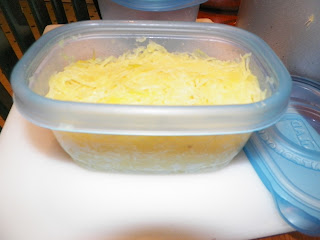Anyway, much of today was devoted to what may now be my favorite squash. First, I picked a laundry basket full.
Wash off the dirt, cut off stem, then cut in half lengthwise.
Next, scoop out the seeds and stringy "guts". I used an icecream scoop.
Place cut side down in a shallow baking dish with a little bit of water. Bake at 350 for 20-30 minutes, depending upon the size of the squash. Basically, you just want to cook until the flesh is tender. I usually turn it over to cut side up halfway through, though I do not think this is necessary.
After cooking, let cool. Then scoop out the flesh. This is when you will see where the spaghetti squash gets its name. It comes out looking like thin spaghetti noodles.
Now you can either cook and enjoy, or freeze it. If you want to cook it, here is a site that offers several recipes. Many people use this squash in place of noodles...there is even a spaghetti squash lasagna!
To freeze: There are two different ways that I froze some of my squash today.
The first is to follow the above steps, then pack tightly into freezer boxes (leaving a one inch head space).
I think spaghetti squash tastes a lot like cushaw, so my guess is it will make a yummy pie. So, I wanted to freeze some for future pies. To do this, I pureed the cooked squash in my blender. I had to add a tiny bit of water. Then I stored the puree into a freezer bag. I froze 2 cups at a time, enough for one pie.
Some interesting facts about squash:
*There are two types of squash, winter and summer. Spaghetti squash, as well as butternut, acorn and others are winter squash. Winter squash have harder skins (you'll learn this when you go to cut it in half!) and summer squash (zucchini) are softer. Summer squash retain more water and will last about a week in the fridge. Some winter squash will last months in a cool, dry basement. Spaghetti squash will last one month when stored this way. (obviously, this is BEFORE you cut it open, etc)
*Squash is a good source of vitamins A and C (the seeds are good for Vitamin E), magnesium, potassium, calcium (about 10% DV), beta carotene and antioxidants. Low caloric to boot, all these make for a healthy and delicious dish!
Have you ever grown your own squash? What's your favorite? How do you preserve it?







Wow, that looks healthy. I've never thought of using squash in lieu of noodles. That would be a welcome change :)
ReplyDelete